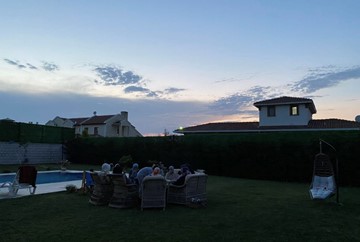Sophomore Wula Cham, a nursing major, lives in Brownell Hall and observes Ramadan in between classes. She breaks her fast at night at Connecticut Hall, where she takes advantage of the Kosher addition for observing Muslim students. Sometimes she also heads to Ali Baba's Kitchen, a family-owned restaurant in nearby Hamden that serves Halal food.
Cham grew up in Gambia in a big compound with all of her family. Her family arrived in the U.S. in 2017, when she was 15. That year, they fled the country as President Yahya Jammeh’s dictatorial rule made everyday life too dangerous, she said. After Cham and other children were told to stop going to school, her parents brought her to the U.S.
Coming to America was a culture shock for her, she said. At home in Gambia, everyone was Muslim. There was no temptation to eat or get distracted during Ramadan, because everyone around her was fasting. Breaking the fast was easier with traditional foods. Praying was simple.
At Southern, Cham schedules her prayer around her classes. She often uses the prayer room in the Student Center, but will sometimes pray before leaving for class or after going back to her dorm after class. There are not a lot of Muslim students on campus, she said, so they do not get accommodations to pray during classes.
“[We are] forced to either delay our prayer or pray previously to class,” she said.
Some students delay prayer for the whole day and have to pray the five prayers when they get home or back to the dorms, she said.
 This year, Ramadan runs from April 1 to May 1. In Islam, it honors the moment that God revealed the holy book, or Qurʾān, to the prophet Muhammad. Because the calendar Muslims use, called the Hijrī calendar, is shorter than the 12-month Gregorian calendar, Ramadan shifts dates each year. It is marked by a month of daily fasting and prayer, with nightly Iftar meals that break the fast.
This year, Ramadan runs from April 1 to May 1. In Islam, it honors the moment that God revealed the holy book, or Qurʾān, to the prophet Muhammad. Because the calendar Muslims use, called the Hijrī calendar, is shorter than the 12-month Gregorian calendar, Ramadan shifts dates each year. It is marked by a month of daily fasting and prayer, with nightly Iftar meals that break the fast.
Gozde Yildiz, a commuting freshman health science major, is happy to have the ability to celebrate Ramadan with loved ones again. The pandemic caused her family to have to isolate from other members and do Ramadan and Iftars at home.
Now, Yildiz said they are “observing Ramadan with our loved ones, have a big Iftar table [that] brings joy, practice religion at mosques, and so much more of what Ramadan has to offer.”
Although she celebrates from home because she is a commuter (she did not want to be photographed, but submitted the above photo for this story), she heard about the food options for students on campus and is grateful to SCSU and to the Muslim Students Association for making it a possibility.
As wonderful as that is, she said, she still thinks about students celebrating alone on campus.
"Maybe there could have been option to have an open Iftar as a Muslim community at Southern,” she said. “But due to Covid it's not being held.”
Gozde’s twin, Sema Yildiz, is also a commuting freshman health science major. While the pandemic is ongoing, she said, she feels like things are back to normal. The family is back to celebrating together, and they are attending Diyanet Mosque of New Haven after a fire and then Covid closed the building to worshippers for multiple years. The mosque is still not offering Iftar because of Covid, she said.
This is Sema’s first year at Southern, and she is impressed by the effort being put in for Muslim students on campus.
Her professors are understanding of late classes and assignments. The dining hall provides Iftar food and Sahor packages to students on campus. She called it a welcoming place for Muslim students.
Off campus, she added, she hopes her family stays healthy and safe now that the city's mask mandate has been lifted.
“I hope that I can, 'till the end of Ramadan, go to the mosque to pray and celebrate with friends and family,” she said.
As of 2023, this article has been updated to protect the identity of one of the students who was originally interviewed, per their request.